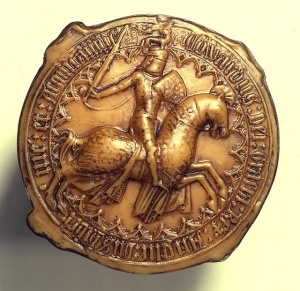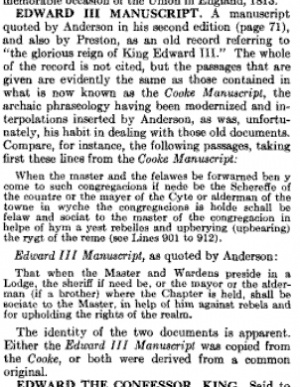Edward III: Unterschied zwischen den Versionen
Keine Bearbeitungszusammenfassung |
KKeine Bearbeitungszusammenfassung |
||
| (7 dazwischenliegende Versionen von 2 Benutzern werden nicht angezeigt) | |||
| Zeile 1: | Zeile 1: | ||
[[Datei:EdwardSeal.jpg|thumb|300px|Great Seal of Edward III.<br>"Description: Modern reproduction of the reverse of Edward III's fifth seal used in the first half of the 1340s. Our Catalogue Reference: Not Accessioned. This image is from the collections of [http://www.flickr.com/photos/nationalarchives/2977800339/in/set-72157608732674049/ → The National Archives]. Feel free to share it within the spirit of the Commons." ]] | |||
[[Datei: | [[Datei:Edward_III_Manuscript.jpg|thumb|300px|(Encyclopedia of Freemasonry, Part 1 Von Albert G. Mackey, H. L. Haywood)]] | ||
== Eduard | ==Eduard III.== | ||
'''Quelle: Wikipedia http://de.wikipedia.org/wiki/Eduard_III._%28England%29''' | |||
Eduard III. (engl. Edward; * 13. November 1312 auf Windsor Castle; † 21. Juni 1377 im Sheen Palace, Richmond) entstammte der Dynastie der Anjou-Plantagenêt, und war von 1327 bis 1377 König von England und Wales und gilt als einer der bedeutendsten englischen Herrscher des Mittelalters. | |||
==Edward III Manuscript== | |||
'''Quelle: Encyclopedia of Freemasonry, Mackey''' | |||
A manuscript quoted by [[James Anderson|Anderson]] in his second edition (page 71), and also by [[William Preston|Preston]], as an old record referring to "the glorious reign of King Edward III." The whole of the record is not cited, but the passages that are given are evidently the same as those contained in what is now known as the Cooke Manuscript, the archaic phraseology having been modernized and interpolations inserted by Anderson, as was, unfortunately, his habit in dealing with those old documents. | |||
Compare, for instance, the following passages, taking first these lines from the [[Cooke-Manuskript|Cooke Manuscript]]: | |||
:''When the master and the felawes be forwarned ben y come to such congregations if nede be the Schereffe of the countre or the mayer of the Cyte or alderman of the towne in wyche the congregations is hold schall be felaw and sociat to the master of the congregation in helpe of hym a yest rebelles and upberying (upbearing) the rygt of the reme (see Lines 901 to 912).'' | |||
Edward III Manuscript, as quoted by Anderson: | |||
:''That when the Master and Wardens preside in a Lodge, the sheriff if need be, or the mayor or the alderman (if a brother) where the Chapter is held, shall be sociate to the Master, in help of him against rebels and for upholding the rights of the realm.'' | |||
The identity of the two documents is apparent. Either the Edward III Manuscript was copied from the Cooke, or both were derived from a common original. | |||
==Siehe auch== | ==Siehe auch== | ||
*[[Cooke-Manuskript | *[[Cooke-Manuskript]] | ||
*[[Wilhelm Begemann]] | *[[Wilhelm Begemann]] | ||
*[[Manuskripte]] | *[[Manuskripte]] | ||
== Links == | |||
*Encyclopedia of Freemasonry http://books.google.de/books?id=lU5e-E6wBeEC&lpg=PP1&dq=mackey&pg=PA314#v=onepage&q&f=false | |||
[[Kategorie:Persönlichkeiten|EdwardIII]] | |||
Aktuelle Version vom 13. März 2019, 08:35 Uhr

"Description: Modern reproduction of the reverse of Edward III's fifth seal used in the first half of the 1340s. Our Catalogue Reference: Not Accessioned. This image is from the collections of → The National Archives. Feel free to share it within the spirit of the Commons."
Eduard III.
Quelle: Wikipedia http://de.wikipedia.org/wiki/Eduard_III._%28England%29
Eduard III. (engl. Edward; * 13. November 1312 auf Windsor Castle; † 21. Juni 1377 im Sheen Palace, Richmond) entstammte der Dynastie der Anjou-Plantagenêt, und war von 1327 bis 1377 König von England und Wales und gilt als einer der bedeutendsten englischen Herrscher des Mittelalters.
Edward III Manuscript
Quelle: Encyclopedia of Freemasonry, Mackey
A manuscript quoted by Anderson in his second edition (page 71), and also by Preston, as an old record referring to "the glorious reign of King Edward III." The whole of the record is not cited, but the passages that are given are evidently the same as those contained in what is now known as the Cooke Manuscript, the archaic phraseology having been modernized and interpolations inserted by Anderson, as was, unfortunately, his habit in dealing with those old documents.
Compare, for instance, the following passages, taking first these lines from the Cooke Manuscript:
- When the master and the felawes be forwarned ben y come to such congregations if nede be the Schereffe of the countre or the mayer of the Cyte or alderman of the towne in wyche the congregations is hold schall be felaw and sociat to the master of the congregation in helpe of hym a yest rebelles and upberying (upbearing) the rygt of the reme (see Lines 901 to 912).
Edward III Manuscript, as quoted by Anderson:
- That when the Master and Wardens preside in a Lodge, the sheriff if need be, or the mayor or the alderman (if a brother) where the Chapter is held, shall be sociate to the Master, in help of him against rebels and for upholding the rights of the realm.
The identity of the two documents is apparent. Either the Edward III Manuscript was copied from the Cooke, or both were derived from a common original.
Siehe auch
Links
- Encyclopedia of Freemasonry http://books.google.de/books?id=lU5e-E6wBeEC&lpg=PP1&dq=mackey&pg=PA314#v=onepage&q&f=false

